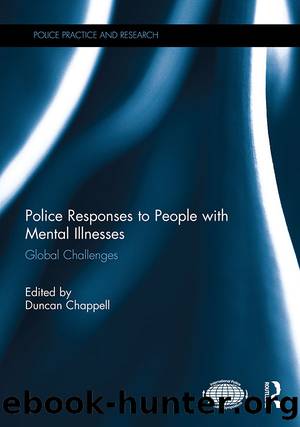Police Responses to People with Mental Illnesses by Duncan Chappell

Author:Duncan Chappell [Chappell, Duncan]
Language: eng
Format: epub
Tags: Nonfiction, Social & Cultural Studies, Social Science, Crimes & Criminals, Criminology
ISBN: 9781317977148
Publisher: Taylor and Francis
Published: 2014-07-16T04:00:00+00:00
The âappropriate adultâ
Nemitz and Bean (2001) describe the situation which led to the introduction of provisions under the PACE Act 1984 for an âappropriate adultâ (AA) to be present at police stations during interviews of adults with mental health problems. The vulnerability of the mentally ill in police custody not only increases the propensity for suicide and self-harm but also increases the likelihood of false confessions since many PMI are highly suggestible and likely to agree with anything which they feel will please their questioners (Cummins, 2006; Laing, 1995; Nemitz & Bean, 2001). Increasing prison rates and the numbers of PMI ending up in prison (despite diversion schemes) suggest that this is not happening. In many cases the police fail to ensure that an AA is present and this may be for a number of reasons. One is that the AAâs role is full of contradictions, complex and demanding, appearing to be âsomewhere in the middle of the conflict between the suspect and the [police] officersâ and that there is a lack of suitable and trained people to fill such a role (Cummins, 2006, p. 273). Cummins also suggests that the presence of an AA has an important effect on police behaviour during an interview, increasing the likelihood that legal representation is sought so that evidence cannot be challenged at a later date. So while the role is important it must be carried out by a suitably qualified person or it can do more harm than good. Nemitz and Bean (2001) refer to certain moves in England and Wales to introduce training schemes for volunteers to act as AAs.
A study of police practices and attitudes in one Western European country â Greece
Despite the above-mentioned lack of information on policing PMI in Europe (outside the UK) a small but valuable study of police attitudes towards mentally ill offenders carried out in Greece (Psarra et al., 2008) recommends changing attitudes through education and training. While laws vary according to the particular country, generally in Western Europe it is common practice for acutely mentally ill people to be involuntarily hospitalised. In Greece, where the law concerning involuntary hospitalisation was revised in 1992 (and included Law 2071/92 for the improvement of the health system), police are involved in: the transfer of a person who has refused their legal obligation for psychiatric evaluation to the emergency department psychiatric section; their transfer to the proper psychiatric unit for involuntary admittance, after evaluation by two state psychiatrists, following a district attorneyâs order; and the management of violent offenders suspected as mentally ill, by appeal to the district attorney for psychiatric evaluation (Christodoulou et al., 2002, cited in Psarra et al., 2008).
While there has been a trend towards re-institutionalisation in a number of Western European countries (Priebe et al., 2005), in Greece the mental health system was restructured based on de-institutionalised care with a switch of government funding to enable more autonomous ways of living for the mentally ill, such as sheltered apartments and boarding houses with a
Download
This site does not store any files on its server. We only index and link to content provided by other sites. Please contact the content providers to delete copyright contents if any and email us, we'll remove relevant links or contents immediately.
Chaco's Northern Prodigies : Salmon, Aztec, and the Ascendancy of the Middle San Juan Region after AD 1100 by Paul F. Reed(376)
Digital International Relations by Unknown(371)
Law Enforcement Interpersonal Communication and Conflict Management by Brian Douglas Fitch(365)
Skilled interpersonal communication: Research, theory and practice, Fifth edition by Owen Hargie(355)
The Enduring Color Line in U.S. Athletics by Krystal Beamon Chris M. Messer(351)
Critical Perspectives on Human Security : Rethinking Emancipation and Power in International Relations by David Chandler; Nik Hynek(340)
EPSO CAST Political affairs EU policies: How to succeed in the selection procedure by Franco Reverte José María(325)
Evidence-Based Policy Making in Labor Economics by Hamermesh Daniel S.;Nottmeyer Olga K.;Nottmeyer Olga;King Sarah;King Sarah;King Sarah;(317)
Writing Public Policy - A Practical Guide to Communicating in the Policy Making Process by Catherine F. Smith(297)
Criminological Theory in Context by John Martyn Chamberlain(292)
Rothschild and Early Jewish Colonization in Palestine (Geographical Perspectives on the Human Past) by Ran Aaronsohn(290)
Positive Psychology and Spirituality in Counselling and Psychotherapy (Conflict, Ethics, and Spirituality, 12) by unknow(285)
Tibeton Yoga Its Secret Doc by Evans-Wentz(283)
Threshold Concepts in Women's and Gender Studies by Christie Launius Holly Hassel(278)
Social Problems, Social Issues, Social Science by James Wright(274)
Play in child development and psychotherapy: toward empirically supported practice by Sandra W. Russ(272)
Cognitive Development in Infancy and Childhood (Elements in Child Development) by Mary Gauvain(272)
Latin American Politics and Society by Gerardo L. Munck & Juan Pablo Luna(251)
What Makes a Social Crisis?: The Societalization of Social Problems by Jeffrey C. Alexander(232)
